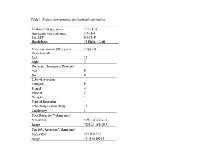Pre-operative fMRI Activation as a Predictor of Language Decline Following Pediatric Epilepsy Surgery
Abstract number :
1.352
Submission category :
9. Surgery / 9B. Pediatrics
Year :
2018
Submission ID :
506700
Source :
www.aesnet.org
Presentation date :
12/1/2018 6:00:00 PM
Published date :
Nov 5, 2018, 18:00 PM
Authors :
Eleanor Fanto, Children's National Medical Center; Chelsea Black, Children's National Medical Center; Xiaozhen You, Children's National Hospital System/NINDS NIH; Leigh Sepeta, Children's National Hospital System/NINDS NIH; William Theodore, National Inst
Rationale: The utility of language fMRI in predicting language outcome following epilepsy surgery has been established in adults but has not yet been examined in pediatric epilepsy. We explored whether location or the overlap between resection extent and fMRI activation predicted post-surgical language change in pediatric epilepsy patients. Methods: Seventeen patients with epilepsy (5.7-18.6 yrs; Table 1) completed neuropsychological evaluation (Table 2) before and after surgery (M follow-up = 2.5 yrs). Reliable Change Index (RCI; a=0.20, 2-tailed) was calculated for each subtest to examine whether a patient exceeded clinical cutoff for language decline post-surgery. Patients also completed a pre-operative fMRI language task (Auditory Description Decision Task) that activates the temporal and frontal language network. Laterality indices (LI) were calculated for IFG and Wernicke’s in SPM using LI Toolbox to determine language dominance. Resection masks were automatically generated to determine resected top10% activation volume based on SPM T values. We used logistic regression and Fisher’s Exact Test to explore relationships among postoperative language decline and the following factors: language dominant side of resection, top 10% activated voxels removed, temporal vs. extratemporal resection, and age at surgery. Results: As a group, sentence repetition was the only different skill post-surgery (M=7.33) compared to pre-surgery (M=5.67, p<0.01); however, RCI analyses revealed that 11/17 (64.7%) patients had significant language decline on at least 1 measure. Language decline did not differ based on dominant vs. nondominant, p=0.13. Temporal resection was associated with decline in naming at trend level, p=0.08. Age at surgery did not predict language decline, p>

.tmb-.jpg?Culture=en&sfvrsn=6f2e6797_0)